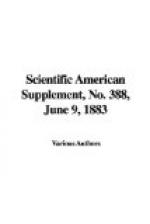For instance, if a person whose blood is in fairly good condition takes a cold that settles on his lungs, he either recovers of it spontaneously or is readily cured by means of some cough mixture; but if his blood be loaded with tubercular matter, the latter is extremely liable to be deposited in his lungs; the cough that was excited in the first place by a simple cold becomes worse and persistent, in a few months his lungs show signs of disorganization, and he has consumption of the acute or chronic type, as the case may be.
On the other hand, if the impure matter by which the blood is loaded be of the kind that causes the pulmonary solidifications of pneumonia, the latter disease is very likely to be developed if a cold on the lungs be caught.
The liability of any individual to attacks of acute pneumonia is therefore determined very largely by the presence or absence in his blood of the matter already alluded to. If his blood be free from it, no cold, however severe, is competent to originate the disease.
There can be no question but that good living and sedentary habits have a strong tendency to befoul the blood; the former renders effective respiration all the more necessary for the removal from the blood of whatever nutritive matter has been taken beyond the needs of the system, and the latter inevitably diminishes the respiratory motions to the lowest point consistent with physical comfort. From these conditions originates the active predisposing cause of pneumonia, to which we have already alluded.
The disease is more fatal in the very young and in the aged; the mortality seems to bear a direct ratio to the respiratory capacity; in young subjects the breathing powers have not been fully developed like the other physical capacities, while in the old the respiratory volume has been diminished by the stiffening of the chest walls and of the lungs by the senile changes already detailed.




